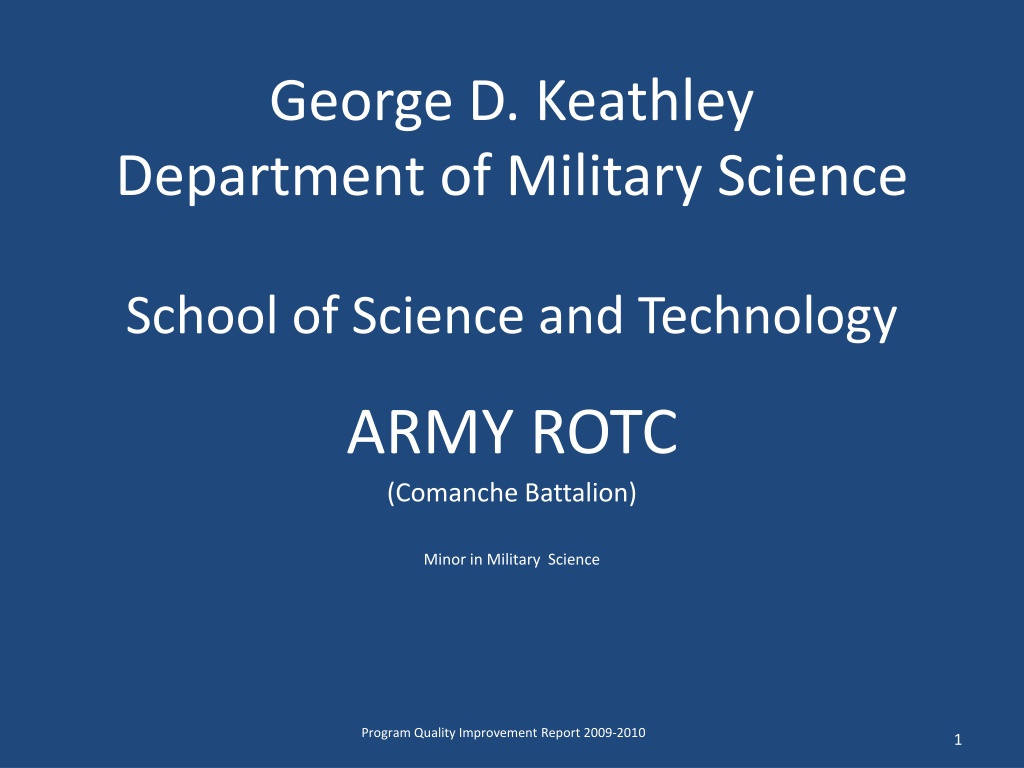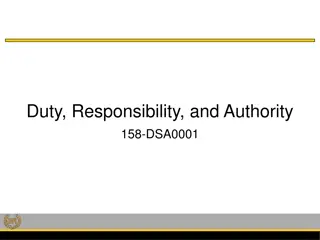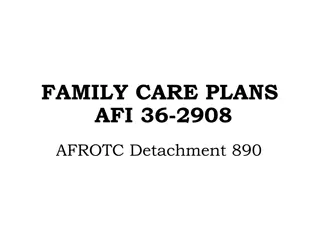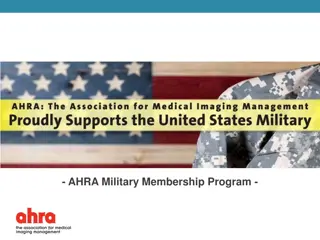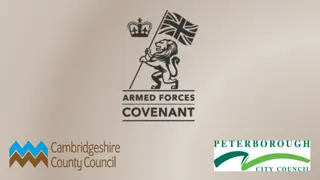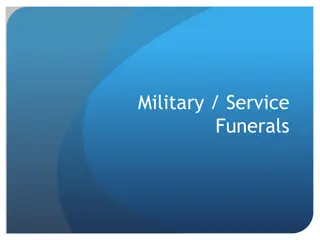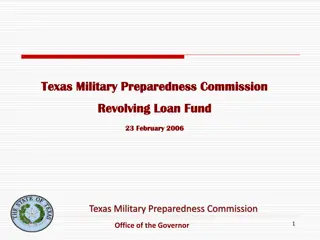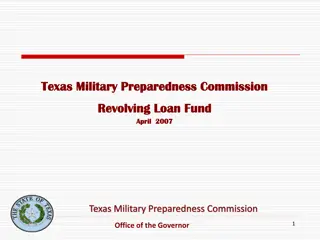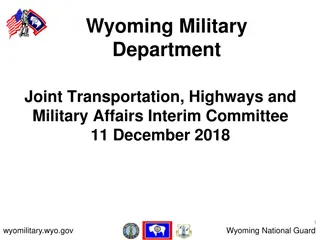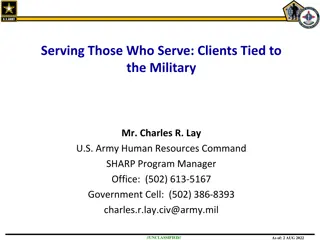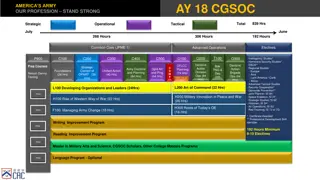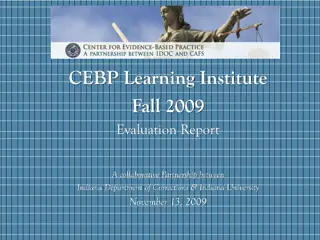Department of Military Science Program Quality Improvement Report 2009-2010
The report outlines student learning outcomes, alignment of outcomes, measures of learning and service outcomes, and leadership assessment within the Department of Military Science. It emphasizes developing leadership potential, ethical conduct, and training for commissioning as Lieutenants in the United States Army.
Download Presentation

Please find below an Image/Link to download the presentation.
The content on the website is provided AS IS for your information and personal use only. It may not be sold, licensed, or shared on other websites without obtaining consent from the author. Download presentation by click this link. If you encounter any issues during the download, it is possible that the publisher has removed the file from their server.
E N D
Presentation Transcript
George D. Keathley Department of Military Science School of Science and Technology ARMY ROTC (Comanche Battalion) Minor in Military Science Program Quality Improvement Report 2009-2010 1
Student Learning or Service Outcomes 1. Student learning or service outcomes Demonstrate leadership potential Act ethically and morally Plan, execute and assess training 2. Outcomes that are required by accrediting agencies Successful completion of the Leadership Development and Assessment Course (LDAC), Fort Lewis, WA Physical Fitness Land Navigation Leadership Assessment Military History Completion Degree completion 2 Program Quality Improvement Report 2009-2010
Alignment of Outcomes Holistic alignment of student learning and service outcomes : We prepare our students for real-world success (University Mission) as leaders in the United States Army (Active Duty, US Army Reserve and Army National Guard) We teach and encourage high ethical standards and instill confidence to excel (School Mission) We train, retain and develop students (cadets) to commission and serve as Lieutenants in the United States Army (Department Mission) 3 Program Quality Improvement Report 2009-2010
Measures of Learning and Service Outcomes 1. Direct measures of student learning outcomes Leadership Evaluations Army Physical Fitness Test (APFT) Exams, Papers, Briefings and Small Group work Practical Exercises (Land Navigation) Indirect measures of student learning outcomes After Action review(AAR) Strategies or methodologies that address shortfalls in student learning or services prior to graduation Mentorship Program Additional training Intervention (if not doing well) Counseling 2. 3. 4 Program Quality Improvement Report 2009-2010
Report on actions from previously chosen three priority outcomes Not applicable this year 5 5 Program Quality Improvement Report 2009-2010
Leadership Assessment outcome and measurements MEASUREMENTS OF STUDENT LEARNING OR SERVICE OUTCOME Methods used to determine validity of measurement instruments Methods used to determine reliability of measurements CURRICULUM AREA OR TARGET AUDIENCE PROGRAM OUTCOME Schedule for measurements Measurements Students should receive at least an S overall rating at LDAC and possess the qualities of an officer in order to commission. All MILS classes with emphasis and data from the MILS 4004 Can earn 1 of 3 scores Raters attend mandatory yearly training in the 23 evaluation Criteria Rater performance review Several times each semester N needs improvement Annually at LDAC Multiple ratings by different raters S Satisfactory E Excellent * See complete list of approved direct and indirect measurements (search program assessment on Cameron s intranet) Program Quality Improvement Report 2009-2010 6 6
Leadership Assessment data Leadership 60% 50% 40% % scoring E 30% 20% 10% 0% 2007 2008 2009 2010 BN 47% 22% 48% 18.52% CU / Nation 19 / 4585 37 / 5015 29 / 5256 27 / 6036 7 Program Quality Improvement Report 2009-2010
Analysis of Leadership Assessment data Leadership 60% 50% 40% % scoring E 30% 20% 10% 0% 2007 2008 2009 2010 USACC 23% 20.83% 17% 17.30% BDE 22.28% 21.73% 19% 17.20% BN 47% 22% 48% 18.52% CU / Nation 19 / 4585 37 / 5015 29 / 5256 27 / 6036 8 Program Quality Improvement Report 2009-2010
Action plan for Leadership Assessment 1. Training on the proper way to rate and individual in the 23 criteria. 2. Ratings are turned in every two weeks. Each rater s performance is reviewed by faculty. 3. No new resources needed to implement plan. 9 Program Quality Improvement Report 2009-2010
Army Physical Fitness Test (APFT) outcome and measurements MEASUREMENTS OF STUDENT LEARNING OR SERVICE OUTCOME Methods used to determine validity of measurement instruments Methods used to determine reliability of measurements CURRICULUM AREA OR TARGET AUDIENCE PROGRAM OUTCOME Schedule for measurements Measurements Students are physically fit All MILS classes with emphasis and data from the MILS 4004 APFT Rubric Graders are faculty members and experienced, senior students Graders have been schooled on the proper grading format as outlined in US army regulations Monthly 1) 2 Min push-ups Yearly for MILS 4004 Complete the APFT with at least 60% in each event 2) 2 Min sit-ups 3) 2 Mile run All events are measured directly against established US Army criteria, based on age and gender * See complete list of approved direct and indirect measurements (search program assessment on Cameron s intranet) Program Quality Improvement Report 2009-2010 10 10
Army Physical Fitness Test (APFT) Assessment data APFT 266.00 265.10 264.00 263.00 262.00 260.00 Score 258.44 258.00 257.00 256.00 254.00 252.00 2007 2008 2009 2010 BN 257.00 263.00 265.10 258.44 CU / Nation 19 / 4585 37 / 5015 29 / 5256 27 / 6036 11 Program Quality Improvement Report 2009-2010
Army Physical Fitness Test (APFT) Analysis of assessment data APFT 266.00 265.10 264.00 263.00 262.00 260.00 258.44 258.00 257.00 Score 256.00 254.00 252.00 250.00 248.00 246.00 2007 2008 2009 2010 USACC 257.31 259.98 258.40 257.80 BDE 253.12 260.84 257.80 257.55 BN 257.00 263.00 265.10 258.44 CU / Nation 19 / 4585 37 / 5015 29 / 5256 27 / 6036 12 Program Quality Improvement Report 2009-2010
Action plan for Army Physical Fitness Test 1. Conduct realistic, challenging and varied Physical Fitness Training to improve overall scores. 2. Physical Fitness is conducted M, W, F from 6:00- 7:00 am. Progress will be checked monthly in the form of the Army Physical Fitness Test (APFT). Actual effectiveness of individual workouts will be analyzed weekly at the Battalion Training Meeting After Action Review (AAR) 3. No new resources needed to implement plan. 13 Program Quality Improvement Report 2009-2010
Land Navigation outcome and measurements MEASUREMENTS OF STUDENT LEARNING OR SERVICE OUTCOME Methods used to determine validity of measurement instruments Methods used to determine reliability of measurements CURRICULUM AREA OR TARGET AUDIENCE PROGRAM OUTCOME Schedule for measurements Measurements Students will be able to orient a map and compass. All MILS classes with emphasis and data from the MILS 4004 Practical exam Use of Army Regulations Land navigation points are rechecked annually with GPS Several times each semester at various locations (CU and Fort Sill) Annually At LDAC (Fort Lewis) * See complete list of approved direct and indirect measurements (search program assessment on Cameron s intranet) Program Quality Improvement Report 2009-2010 14 14
Land Navigation assessment data Land Navigation 90 88 86 84 82 Score 80 78 76 74 72 70 2007 2008 2009 2010 BN 76 86 84.1 87.41 CU / Nation 19 / 4585 37 / 5015 29 / 5256 27 / 6036 15 Program Quality Improvement Report 2009-2010
Analysis of Land Navigation assessment data Land Navigation 95 90 85 Score 80 75 70 65 2007 2008 2009 2010 USACC 80.44 87.11 82 89.3 BDE 79.81 87.37 82.4 88.83 BN 76 86 84.1 87.41 CU / Nation 19 / 4585 37 / 5015 29 / 5256 27 / 6036 16 Program Quality Improvement Report 2009-2010
Action plan for Land Navigation 1. Increase quantity and quality of Land Navigation instruction in the classroom and the field 2. Land navigation is taught in class and leadership lab during both the Fall and Spring Semesters. Mentors and faculty are used to help newer students. Additional training is conducted if needed. 3. No new resources needed to implement plan. 17 Program Quality Improvement Report 2009-2010
Comanche Battalion Facts 106 student cadets in the program 63 contracted 35 prior service (56% of contracted cadets) 80 males (75%) and 26 females (25%) Demographics: White(57%), Black(18%), Hispanic(16%), Asian(3%), American Indian (5%), Other (1%) 7 Junior Reserve Officer Training Corps (JROTC) in footprint (Lawton/Wichita Falls) 16 General Officer Alumni Two brothers enrolled in our program
2009/10 Achievements MacArthur Award Winners (#1 of 36 schools in Brigade) 10 of 44 Cadet Command Scholarship Recipients 1st Place Fort Sill Marine Corps Devil Dog Run (2008, 2009, 2010) 1st Place 2010 Ranger Challenge Competition (Co-ed) (OK/AR) 1st Place 2010 Ranger Challenge Competition (Male) (OK/AR)
AWARDS General MacArthur Award 1992 [Best Battalion in Brigade] 1998 1999 2005 2007 2008 2009 Ranger Challenge Champions 1992 1995 1994 2004 2003 2006 2008 2009 (OK/AR) 2010 (OK/AR) Runners up
Current Initiatives Fort Sill/CU Army ROTC Partnership Program - Field Artillery Captains mentor CU ROTC Seniors Developing CU Army ROTC Alumni Program - 2nd Annual CU ROTC Alumni Reunion (Feb 2011) Wall of Heroes Selected by USAAC as the ROTC Sexual Harassment / Assault Response & Prevention (SHARP) Program Community Service/Volunteering - OBI Blood Drive - Red Cross -Clearing Ice Storm debris
Published information on graduates Academic Year 09-10 # Commissioned Component Summer 2009 4 Active Duty Fall 2009 10 Active Duty 12 Active Duty 3 Army National Guard 1 US Army Reserve 26 Active Duty 3 Army National Guard 1 US Army Reserve Spring 2010 16 Total 30 22 Program Quality Improvement Report 2009-2010
